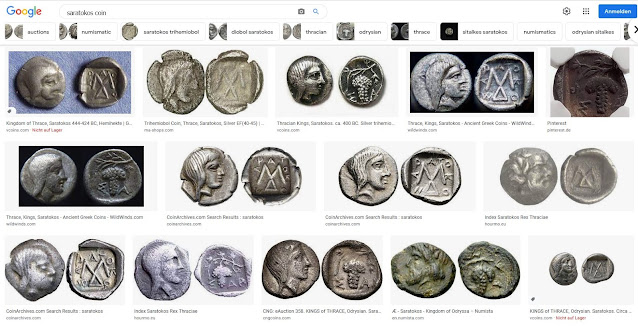Thracian | Indo-European | Turkish | Meaning | Other Info |
achel- ‘water (noun), water (adj.) | Lith. H Akẽlė, Phryg. akala‘water’ | ak- | to flow |
|
an(a) ‘at, on’ | Avest. ana‘along’, Greek aná ‘at, along’, Goth. ana ‘at, towards’ | yan | side | yan-: to turn |
ant(i) ‘against’ | Old-Ind. ánti‘against, nearby, the Lith. añt‘towards, against’, Toch. ānt‘through’, Greek antí ‘against’, etc. | ön | the front side, the face |
|
apa, aphus ‘water, river; a spring’ | Old-Pruss. ape‘river’, apus‘spring’, Old-Ind. p- ‘water’ | ab- | to sprinkle, to flow |
|
ars- ‘to flow; current, river’ | Old-Pruss. RN Arsio, Arse, Old-Ind. árşati ‘to flow’, Hett. arš- ‘the same’ | ark | water canal, river |
|
arta(s), arda(s)‘current. river’ | Old-Ind. árdati‘to flow’, Greek ardō ‘to bedew’ | art | mountain pass |
|
at ‘at, towards’ | Latv. ad ‘at, towards’, Old-Icel. at ‘at, opposite to’ | da | suffix for location |
|
at(u) ‘current, stream’ | Latv. RN Adula, German Attel, Avest. adu- ‘current, stream, channel’ | at-: to sprinkle, to flow | like "beat" in Heartbeat |
|
bur, buris (boris) ‘man’ | Alb. burrë ‚man' | boris<bars>baris | pard | A name that many men had it in their names > Baybars |
būzas ‘a goat’ | Avest. būza- ‘a goat’ | buzağı | oxen baby | old form buzāgu |
chalas ‘mud’ | Old-Bulg. kalə, New-Bulg. kal‘mud’, Czech kal‘swamp; mud, soft soil’ | acc. to Nisandan: çal- veya çap- “çalmak, çamurla sıvamak” | çal-, çamurla sıva-”> çamur: mud, to plaster, to target with mud |
|
dama ‘settlement, place for settling’ | Old-Ind. dhāman- ‘place for dwelling’, Greek thaimós‘house’ | dam, tam | tam- (v) to drop, > dam, tam: a construct, edifice to protect the „things“ from the outer effects (rain, wind)? | starlingdb: Proto-Altaic:*t`āma Meaning:wall, roof Russian meaning:стена, крыша Turkic: *Tām Mongolian:*tama Tungus-Manchu:*tamV- Korean: *tám Japanese:*tàmùruá tone (not corresponding to PT length). See VEWT459. |
dumas ‘dark’ | Lith. dū'mas‘dark, dark brown (for cattle)’, Latv. dms ‘dark brown’ | duman<tuman | dark, very dark; fog | tum-: to get dark |
et(e)r (=jeter-) ‘quick, agile’ | Old-HighGerman ātar‘quick’, Latv. ãtrs ‘quick’ | yet- | to catch up on |
|
kersas ‘black’ | Lith. kéršas ‘on black and white spots’, Bulg. cheren ‘black’, Old-Ind. krsná‘black, dark’ | kara | black |
|
ketri-, ketre- ‘four’ | Greek tetra‘four’, Cymr. pedry- ‘four-fold’, Lith. keturì, Latv. četri, Bulg. četiri‘four’ | dört<tört | four | Greek tettara, Gaulish tartos |
kurp- ‘to burrow’ | Lith. kur̃pti (-iù) ‘to burrow’, Russ. korpat’ ‘to burrow’ | kır- | to dig, to cave in |
|
kurta ‘groove, wood’ | Old-Pruss. korto‘groove’ from the Baltic *kurtā | kurt | (wood)worm |
|
ōstas ‘river mouth’ | Lith. úostas,uostà ‘river mouth; a port’, Latv. uosts-, uosta ‘the same’, Latin ōstium‘river mouth’, Old-Bulg. uostije‘the same’ | aas, aus, ās | mouth |
|
paisa(s) ‘soot’ | Lith. paišai‘soot’ | is | soot | bus>pus : fog |
siltas ‘warm, pleasant’ | Lith. šitas ‘warm, pleasant’, Latv. sìlts ‘warm’, Cymr. clyd‘warm, warming’ | ısın- | to get warmth, to get pleasant with sbd. | ısı: warmth, |
skalp- ‘to beetle, to hit’ | Lith. skabti (-biù, -biaũ) ‘to beetle, to dolly (for laundry)’ | çak- | to hit, to make noise | ? |
suchis, sukis, suku(s) (-os) ‘girl’, resp. ‘boy, juvenile’ | Cymr. hogen‘girl’, hogyn‘boy, lad’, Lith. sūnùs ‘son’, Old-Bulg. səin ‘son’, etc. | kız | girl, female |
|
suka ‘a crack, a gorge, a pass’, | Lith. šùkė ‘a gap, a crack’ | sık | narrow, to get narrow; a measure unit for land | Akkadian Pašāqu: to be narrow, difficult, troublesome |
sula ‘groove’ | Greek hýle‘forest, groove’ | su | water |
|
sunka ‘sap, fluid’ | Lith. sunkà ‘sap (of a tree); fluid’ | su | water |
|
sura (zura) ‘current, stream’ | Old-Ind. sirā' ‘current. stream’ | su | water |
|
suras ‘strong, brave; a hero’ | Old-Ind. sū'ra-h‘a hero, a warrior’, Avest. sū'ra- ‘brave, courageous; a hero’ | sü | soldier |
|
turm- ‘a run, a flight’ | Old-Ind. drámati‘to run’, Greek drómos ‘a run’ | dur- | to stand up, to stay |
|
vair-as (-us) ‘spinning’ | Lith. vairùs, vairas ‘spinning’, Swed. vīrr ‘a spiral’ | ör- | to knit, to spin | look at Turkish egir- to spin; evir-: to turn, to invert, to alter |





















.jpg)